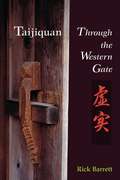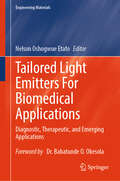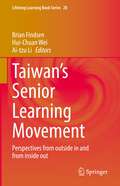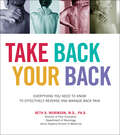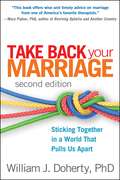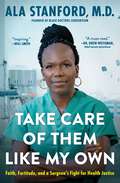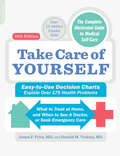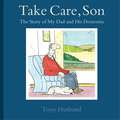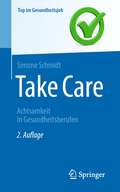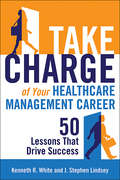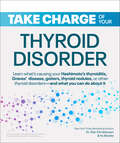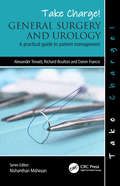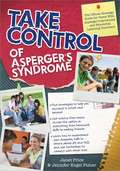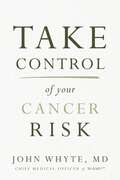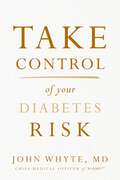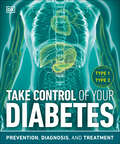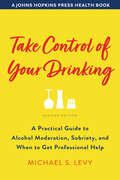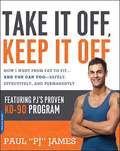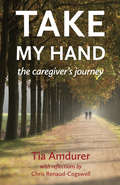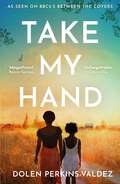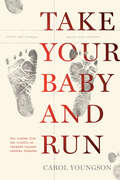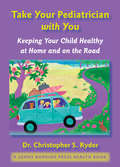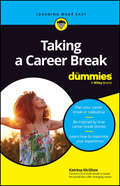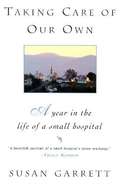- Table View
- List View
Taijiquan: Through the Western Gate
by Rick BarrettWritten specifically for the Western practitioner, Taijiquan: Through the Western Gate blends modern science and philosophy with the traditional wisdoms—drawn from classic t'ai chi literature—that underlie Chinese martial arts. Author Rick Barrett authoritatively describes a wide range of movements, practices, and positions in the context of such topics as being in the zone, effortless power and force versus power, the whole-body energetic connection, instant meditation, and energetic coherence. Step-by-step exercises help make this sometimes daunting discipline simple and accessible.
Tailored Light Emitters For Biomedical Applications: Diagnostic, Therapeutic, and Emerging Applications (Engineering Materials)
by Nelson Oshogwue EtafoThis book provides a comprehensive guide to the development, testing, and medical applications of photoluminescent materials. It covers key material classes—such as quantum dots, organic fluorophores, and lanthanide-doped nanoparticles—and explores how their light emission properties can be tailored for medical use. Readers will find in-depth discussions on biocompatibility strategies, targeted drug delivery with light-triggered release mechanisms, in vivo imaging for real-time therapeutic monitoring, and advanced diagnostic techniques like biosensors and fluorescence assays. The book also delves into photoluminescence-based therapies, including antibacterial treatments, photoimmunotherapy, and cancer phototherapy, offering researchers and practitioners the tools to develop safe and effective next-generation medical technologies.
Taiwan’s Senior Learning Movement: Perspectives from outside in and from inside out (Lifelong Learning Book Series #28)
by Brian Findsen Hui-Chuan Wei Ai-Tzu LiThis volume provides an in-depth analysis of historical and recent developments of senior learning in Taiwan, where publications in English have been scant. It takes a broader view on lifelong learning and active ageing from a theoretical/conceptual base written by prominent international authors- this represents the ‘outside in’ perspective. The ‘inside out’ on the other hand signifies an in-depth investigation of initiatives written by authors from Taiwan who are closely involved with developments in policy and practice. The volume is situated theoretically in the intersection of complementary concepts such as lifelong learning, active ageing, later life learning, learning communities and social movements. It is located geographically and culturally in East Asia where senior learning/education is expanding in response to large populations of older adults and concerns about their physical and social well-being. It is argued that Taiwan is leading the way in terms of innovation and community engagement in regard to older adult learning/education and can thus serve as a model for neighboring countries. By analyzing historical precedents, cultural dynamics, policy trends, research sub-fields and community engagement this book is of interest to both East Asian and Western scholars, practitioners, policy-makers and students amongst the fields of lifelong learning, social gerontology and educational psychology.
Take Back Your Back: Everything You Need to Know to Effectively Reverse and Manage Back Pain
by Beth B. Murinson“Primary outcomes from this book, such as . . . better decisions about treatment . . . will undoubtedly be followed by better clinical outcomes for patients.” —Rollin M. Gallagher, Deputy National Program Director for Pain ManagementAlthough back pain is common, the fix isn’t. Take Back Your Back shows you how to diagnose and manage your particular back pain and alerts you to red flags and often-misdiagnosed issues that may worsen your condition.—Do you have non-radiating pain on one side of the spine? Your issue may be Muscle Injury, and you need to control inflammation.—Does your pain shoot down the leg? You may have a Slipped Disc that requires physical therapy and possibly surgery.—Does your pain worsen with sitting and ease off with walking? You may have Sciatic Nerve Compression and need special stretching exercises.Leading back pain expert Beth Murinson, M.D., director of pain education at Johns Hopkins School of Medicine, brings together the latest science on back pain diagnosis and treatment from medications and surgical procedures to traditional physical therapy to alternative modalities such as acupuncture, meditation, and water and inversion therapies that are showing promise.For each condition and procedure, you’ll learn what to expect in the hospital or the doctor’s office, what self-therapy solutions you can do on your own, and when to seek out intervention. Detailed illustrations and easy-to-understand descriptions help you select the best treatment options to improve your unique type of back pain and live a back-healthy life.
Take Back Your Marriage, Second Edition
by William J. DohertyAll couples walk to the altar dreaming of happily ever after, but many forces in our society work against healthy lifelong commitment. Renowned family therapist William J. Doherty has helped many thousands of readers understand how cracks can develop in even a rock-solid marriage--and what steps they can take to keep their love strong. Vivid stories illustrate ways to break free of common traps like confusing desires with needs, seeing your spouse as a consumer product to be traded in for a new model, or becoming overtime parents instead of full-time partners. Empathic and motivating, Dr. Doherty shows how to create doable relationship rituals that stand the test of time. The updated second edition incorporates Dr. Doherty's ongoing experience counseling couples in conflict, plus the latest information on marriage and health, how divorce affects kids, the pitfalls of social media, and more.
Take Care of Them Like My Own: Faith, Fortitude, and a Surgeon's Fight for Health Justice
by Ala StanfordThe founder of the Black Doctors Consortium highlights the devastating racial injustices in our healthcare system in this inspirational memoir and empowering call to action.Dr. Ala Stanford knew she wanted to be a doctor by the time she was eight years old. But role models were few and far between in her working-class North Philly neighborhood. Her teachers were dismissive, and the realities of racism, sexism, and poverty threatened to derail her at every turn. Nevertheless, thanks to her faith, family, and the sheer strength of her will, today she is one of the vanishingly small number of Black women surgeons in America—and an unrelenting force in the fight for health justice. In Take Care of Them Like My Own, Dr. Stanford shares an unflinching account of her story, explaining how her experiences on both sides of the scalpel have informed her understanding of America&’s racial health gap, an insidious and lethal form of inequality that exacts a devastating toll on Black communities across the country, affluent and underserved alike. When Covid-19 arrived in her hometown of Philadelphia, she knew it would disproportionately affect the Black population. As the city stood idly by, unwilling or unable to protect its most vulnerable citizens, Dr. Stanford took matters into her own hands. She rented a van, made some calls, and began administering tests in church parking lots. Soon, she found herself at the helm of a powerful grassroots campaign that successfully vaccinated tens of thousands of Philadelphians. She and her movement are living proof that by drawing on faith, community, and inner strength, everyday people can affect tremendous change. Part memoir, part manifesto for health equality and justice, Take Care of Them Like My Own offers urgent lessons about the power of communities working together to take care of one another and the importance of fighting for a healthcare system that truly fulfills its promise to all Americans.
Take Care of Yourself
by Fries James F. Vickery Donald M.The worldOCOs bestselling health guide offers new material on the most recent critical health issues such as obesity, as well as additional new and updated information. Covering over 175 healthcare problems and symptoms, "Take Care of Yourself" is simple to use. Readers can look up their symptoms to locate an explanation of likely causes and possible home remedies, while diagrams show how to recognize problems and treat them, and decision charts advise when itOCOs time to see a doctor. This comprehensive guide also covers emergencies, the 20 things everyone should keep in a home pharmacy, and how to work best with a doctor. "
Take Care, Son: The Story of My Dad and his Dementia
by Tony HusbandHi Dad . . . can we have a chat about your dementia . . . Can you remember how it started?When Ron Husband started to forget things - dates, names, appointments . . . daft things, important things - it took a while to realise that this was 'a different form of forgetting'. But it was just the first sign of the illness that gradually took him away from the family he loved.This is the touching, illustrated story of Tony's father and how dementia slowly took him away from his family. The title is a reference to his last words to his son - on a day when Tony had spent the day in the care home with no sign of recognition. The book is framed as a chat between Tony and his dad, who fades away through the last few pages of the book."... rather wonderful cartoon strips ... chronicling his father's dementia with loving charm and wit." Stephen Fry, Twitter
Take Care, Son: The Story of My Dad and his Dementia
by Tony HusbandHi Dad . . . can we have a chat about your dementia . . . Can you remember how it started?When Ron Husband started to forget things - dates, names, appointments . . . daft things, important things - it took a while to realise that this was 'a different form of forgetting'. But it was just the first sign of the illness that gradually took him away from the family he loved.This is the touching, illustrated story of Tony's father and how dementia slowly took him away from his family. The title is a reference to his last words to his son - on a day when Tony had spent the day in the care home with no sign of recognition. The book is framed as a chat between Tony and his dad, who fades away through the last few pages of the book."... rather wonderful cartoon strips ... chronicling his father's dementia with loving charm and wit." Stephen Fry, Twitter
Take Care: Achtsamkeit in Gesundheitsberufen (Top im Gesundheitsjob)
by Simone Schmidt55 Übungen für mehr Achtsamkeit im Berufsleben! Der Schlüssel für eine gute Betreuung im Gesundheitswesen ist die Wahrnehmung der Bedürfnisse des Gegenübers und von sich selbst. Besonders in Zeiten, in denen Zeitdruck und Stress alltäglich sind, ist es herausfordernd empathisch zu bleiben. Einfach im Alltag einzusetzen und zum Teamtraining geeignet. Die zweite Auflage ist komplett überarbeitet.
Take Charge of Your Healthcare Management Career: 50 Lessons That Drive Success (ACHE Management)
by Kenneth R. WhiteInstructor Resources: Teaching tips, sample syllabus and a sample course schedule. Success isn’t something you are born with—it is carefully cultivated and mastered. And a job, when it works well, can fit like a glove and provide immense personal and professional satisfaction. This book’s 50 succinct lessons will guide students as they begin their careers in healthcare management and help them achieve success and professional fulfillment—whatever their role. Each of the 50 lessons outlines traits, behaviors, and skills needed to maximize strengths, master career success, and achieve the perfect job fit. White and Lindsey, in various academic and healthcare management roles, have provided career counseling for hundreds of students and early careerists. Each lesson concludes with helpful exercises that will prompt self-reflection and recommended resources for additional information. Written in a conversational, friendly style, the 50 lessons broadly cover three major areas: managing yourself, managing your job, and taking charge of your career. The 50 lessons are filled with bulleted lists and quick tips and address specific topics such as: Establishing a life vision and developing a personal brand Managing the first 90 days of a healthcare management position Mastering presentations through writing and speaking tips Building and supporting strong teams Developing a professional development plan Balancing life and work New graduates of master’s programs and early careerists in the field will particularly benefit from this book, but readers at other points in their career will also find it useful.
Take Charge of Your Thyroid Disorder: Learn What's Causing Your Hashimoto's Thyroiditis, Grave's Disease, Goiters, or (Take Charge)
by Dr. Alan Christianson Hy BenderRestore your thyroid balance with this no-nonsense informationUnusual fatigue, unexplained weight loss or gain, a racing heart, confusion, tremors, anxiety and depression, hair loss ... an ailing thyroid can cause any combination of these symptoms or dozens of others, making it difficult for even experienced doctors to recognize when you have a thyroid disorder. Learn the ins and outs of Hashimoto's Thyroiditis, Grave's Disease, goiters, and thyroid nodules, among other thyroid ailments. Millions of people live with thyroid disorders, detected and undetected. The next best thing to a personal thyroid specialist, this invaluable guide helps you navigate the maze of conflicting information and determine your best course of action.This guide will help you find the answers you're looking for. Within these pages, you'll find in-depth looks at thyroids, how they work and how they can go bad, advice on finding the perfect doctor and reaching a diagnosis, guidance on dealing with other thyroid-related issues such as thyroid cancer and adrenal gland disease, and even tips for living a healthy lifestyle, regardless of the setbacks. Discover the path toward a healthy thyroid and start your journey today!
Take Charge! General Surgery and Urology: A practical guide to patient management (Take Charge)
by Richard Boulton Alexander Trevatt Daren FrancisAs a junior doctor starting a surgery or urology rotation, you are expected to take charge of referrals from - and give specialist advice to - A&E, GPs and other specialties. Often you will have had very limited surgical experience and only an off-site registrar for support. This pocket-sized book provides a quick, reliable reference guide for the initial management of the common surgical referrals, with guidance as to what complaints require admission and which can be sent home for outpatient or GP follow-up. It will help relieve the stressful experience of being on-call, alleviating some of the anxiety and making shifts more bearable.
Take Control of Asperger's Syndrome: The Official Strategy Guide for Teens with Asperger's Syndrome and Nonverbal Learning Disorder
by Jennifer Engel Fisher Janet PriceTake Control of Asperger's Syndrome: The Official Strategy Guide for Teens With Asperger's Syndrome and Nonverbal Learning Disorder is a unique handbook for kids and teens on living successful lives with these disorders by taking control of their strengths to overcome their weaknesses. Drawing on their experiences as parents and teachers of students with Asperger's syndrome (AS) and Nonverbal Learning Disorders (NLD), the authors provide tips on understanding the disorders, living with the symptoms, succeeding in school, completing homework, talking to others about strengths and needs, making friends and socializing, and using technology to connect with other kids and teens with these disorders. By interviewing dozens of kids and teens who live with AS and NLD, the authors include ideas, information, and advice for students, by students just like them. This handy guidebook is sure to help any child or teen with AS or NLD navigate life's challenges with successful outcomes.
Take Control of Your Cancer Risk
by John Whyte, MD, MPHYou have cancer. Three words no one ever wants to hear, yet each year, over a million people in the United States alone do.But what if there was a way for fewer people to hear these words?One of the biggest myths regarding cancer is that it&’s mostly genetic--meaning that you have no control over whether you get it. While genetics do have an impact, the truth is that your lifestyle and environment play the major role.Take Control of Your Cancer Risk: A WebMD Essential Guide shares straightforward information and equips you with strategies to help you on a journey to better health, including:assessing your cancer riskknowing which screenings you need, and whenlearning the role food, exercise, and sleep playunderstanding the relationship between stress and cancerYou have the power to reduce your cancer risk--and this book will show you just how easy it is.
Take Control of Your Diabetes Risk
by John Whyte, MD, MPHFrom the Chief Medical Officer at WebMD, the world&’s largest provider of trusted health information, learn how to reduce your diabetes risk and change your mindset from I hope I don&’t get diabetes to I can prevent diabetes.You have diabetes.Three words no one ever wants to hear, yet each year, over a million people in the United States alone do.So now what?Take Control of Your Diabetes Risk shares straightforward information and equips you with strategies to help you on a journey to better health, including:Knowing the causes of the different types of diabetesLearning the role food, exercise, and sleep playUnderstanding the relationship between diabetes, heart disease, and cancerYou have the power to reclaim your life after a prediabetes or diabetes diagnosis--and this book will show you just how easy it is.
Take Control of Your Diabetes: Prevention, Diagnosis, and Treatment (DK Medical Care Guides)
by DKIf you or a loved one is living with type 1 or type 2 diabetes, you need this friendly guide to managing health, diet, physical activity, and treatment. This book is packed with simple, easy-to-understand explanations of how diabetes works and practical, positive advice for preventing or living with it. Illustrated in full color throughout, it includes step-by-step illustrated sequences, flowcharts, and diagrams. Routines such as how to monitor and control blood glucose are explained in the clearest possible way. Find out how the types of diabetes differ, what signs to look out for, how to care for children with diabetes, how to reduce the risk of long-term complications, what to do in emergencies, and how to stay motivated and positive. Take Control of Your Diabetes will help you make successful lifestyle choices to promote health, be active, eat healthily, and thrive, not just survive.
Take Control of Your Drinking: A Practical Guide to Alcohol Moderation, Sobriety, and When to Get Professional Help (A Johns Hopkins Press Health Book)
by Michael S. LevyAccepting that there is no one-size-fits-all approach to controlling drinking, the latest edition of this bestselling book will help you assess your drinking and determine whether moderation or abstinence is the best path for you.For decades, the standard treatment for people struggling with alcohol consumption has focused on convincing them to admit that they are an alcoholic, to stop drinking entirely, and to enter into a program, most commonly Alcoholics Anonymous. But in his more than thirty-five-year career as an addiction specialist working with people who want to change their drinking habits, Michael S. Levy has found that the routes to behavioral change actually vary. And although abstinence is the successful route for many people, others can moderate their drinking on their own or with professional help. In this practical, effective, and compassionate book, Levy helps people take control of their alcohol problem by teaching them how to think about and address their drinking habits. Beginning with a set of self-assessments that reveal whether the reader's use of alcohol is creating problems, Levy explains the causes of problem drinking, discusses the growing recognition of the various ways an alcohol use disorder can show itself, and talks about why it is so difficult to change. Offering advice for choosing between moderating your drinking or abstaining altogether, he also touches on coping with slipups, fighting helplessness and the fear of failure, and knowing when moderation is not achievable. The book is unique in that instead of telling people what they need to do, it meets people at their stage of change and level of readiness to change and helps them decide for themselves what they need to do. Drawing on the latest scientific evidence, this new edition includes• a chapter on the concept of self-medication—a useful but at times overused idea;• a chapter on the concurrent use of drugs (particularly cannabis) during recovery;• an exploration of modern strategies for dealing with drinking, including technology (apps that count drinks, for example) and medications that curb alcohol consumption; • reflections on the use of stigma;• communication strategies for individuals seeking to share their struggle with others;• an exploration of common triggers;• additional worksheets and tips to achieve success; • further material about self-help programs; and • insights about the dark side of addiction treatment.Ultimately, Take Control of Your Drinking empowers people to tackle their drinking problem and gives them the freedom to do so in a way that fits with their own lifestyle and values. This book is useful for anyone who may find that they are drinking too much, for the loved ones of such people, and for clinicians who want to broaden their skills when working with people who struggle with alcohol.
Take It Off, Keep It Off: How I Went from Fat to Fit . . . and You Can Too -- Safely, Effectively, and Permanently
by Paul Pj" JamesA personal trainer and former runway modelOCOs proven fitness and nutrition program for permanent weight loss and his story of intentionally gaining and losing 100 poundsa
Take My Hand: The Caregiver’s Journey
by Tia Amdurer Chris Renaud-CogswellTake My Hand is a welcome, practical guide for the emotional journey of caregiving.The caregiver’s twisting and emotional journey is often bittersweet, combining feelings of exhaustion, reflection, love, frustration, delight, denial, connection, and loneliness. Just as they have taken on hand-holding for a loved one who needs multi-faceted support, many caregivers understandably feel overwhelmed and find themselves wishing for someone to guide them. Take My Hand is that resource. Written by Tia Amdurer, a Licensed Professional Counselor with a background in hospice, bereavement, grief, and loss, Take My Hand is structured into stand-alone chapters that can serve as a practical guide while navigating the different aspects of care for a loved one during the final years. Within each chapter are the witty, insightful, and heartfelt commentaries from Chris Renaud-Cogswell, penned as she took on the role of caregiver for her parents. Pages for note-taking and journaling are formatted to encourage self-reflection along the way.
Take My Hand: The inspiring and unforgettable BBC Between the Covers Book Club pick
by Dolen Perkins-Valdez'Shot through with spirit and hope, it's one hell of a book' Stylist, Books You Can't Miss in 2022Montgomery, Alabama. 1973. Fresh out of nursing school, Civil Townsend has big plans to make a difference in her community. At the Montgomery Family Planning Clinic, she intends to help women make their own choices for their lives and bodies.But when her first week on the job takes her down a dusty country road to a tumbledown cabin, she's surprised to find that her new patients are just eleven and thirteen years old. Neither of the Williams sisters has even kissed a boy, but they are poor and Black, and for those handling their welfare benefits, that's reason enough to have the girls on birth control. As Civil grapples with her new responsibilities, she takes India and Erica into her heart and comes to care for their family as though they were her own. But one day she arrives at their door to discover the unthinkable has happened, and nothing will ever be the same.Inspired by true events and a shocking chapter of American history, Take My Hand is a novel that will open your eyes and break your heart. An unforgettable story about love and courage, sisterhood and solidarity, it is also a timely and hopeful reminder that it only takes one person to change the world.
Take Your Baby And Run: How nurses blew the whistle on Canada’s biggest cardiac disaster
by Carol YoungsonForeword by Lanette Siragusa, RN NM Take Your Baby and Run is Carol Youngson's first-hand account of the shocking ineptitude and misogynistic behaviour that led to the death of twelve children, primarily infants, under the care of Dr. Jonah Odim at Winnipeg's largest hospital in 1994. Youngson was the nurse in charge of the cardiac unit and in her book she details the dysfunctional hospital hierarchy that allowed this tragedy to unfold, leading to the longest running inquiry in Canadian history. Sadly, the themes of this book are just as relevant today during our current health crisis.
Take Your Pediatrician with You: Keeping Your Child Healthy at Home and on the Road (A Johns Hopkins Press Health Book)
by Christopher S. RyderNamed One of the Best Consumer Health Books of 2007 by Library JournalIt's three o'clock in the morning and your child is screaming in pain. To make matters worse, you and your family are vacationing in a strange city. What should you do? Call the front desk? Your family pediatrician? An ambulance?From in-flight earaches to strep throat, from poison ivy to insect bites, illness and injury are common and unwelcome traveling companions. You need to know when to treat your child yourself and when to seek professional medical care. This compact handbook tells you how to decide and then puts crucial information for preventing and treating acute childhood illnesses and injuries at your fingertips. In Take Your Pediatrician with You, Dr. Christopher Ryder offers expert advice on keeping children safe and healthy at home and on the road. He includes detailed instructions for creating a children's medical care kit to use at home or while traveling. Also included are descriptions of common childhood illnesses and summer woes; travel tips; accident prevention; and guidelines for emergency care. A chapter on international adoption guides parents through the process of bringing a child home safely. As well as a reassuring travel companion, this valuable resource will become the "turn-to" guide at home and in childcare centers.
Taking A Career Break For Dummies
by Katrina McGheeTaking a career timeout could be the window of opportunity you’ve been looking for Taking A Career Break For Dummies shows you that a career break could be life-changing. Career breaks give us a chance to pause to identify opportunities and dreams, focus on the things we’ve been missing, and develop new skills. This book empowers you to take the leap into your next chapter. There are dozens of reasons you might want to do it, but whatever your circumstance, this friendly Dummies guide will help you value your own well-being, give yourself permission to grow and explore, and reclaim your time, your life, and your happiness. Develop your plan for taking a break from your career and for transitioning back when you’re ready Set a budget for your break, create a realistic timeline, and make it happen Access practical tools and resources to help you on your career break journey Build a positive mindset so you can enjoy your break and return to your career feeling renewedFor anyone looking for a new direction, feeling burned out, or longing to reignite that inner spark, Taking a Career Break For Dummies is a must. If you’re looking for help structuring your planned time off, you’ll also love the hands-on guidance and examples inside.
Taking Care of Our Own: A Year in the Life of a Small Hospital
by Susan GarrettGarrett's compelling depiction of the hospital in York, Maine, that she administered for six years becomes her occasion to examine what she terms the "fix" today's medical practitioners find themselves in. Noting that market competition has not contained medical costs, she shows us the turf battles within the system as her not-for-profit hospital attempts to reinvent itself to survive. What services should be added to compete in the hospital marketplace? Contract for a traveling CAT scanner owned by a for-profit firm? Institute a cardiology lab, a market niche? The 79-bed, 80-year-old York Hospital is vexed by its perceived mandate to take care of its own. Along with the affluent summer folk, the hospital's "neighbors" include the likes of homeless Tim Bailey, who turns up with chest pains each Christmas Eve and is hospitalized so he needn't be alone for the holidays; Elizabeth Littlejohn, a 19-year-old bulimic with a hospital bill of $76,000, who defaults on her $10 monthly payments and whose dirt-poor family has looked to York Hospital for social services for three generations. As Garrett ruminates on what hospitals should contribute to their communities, she vivifies the daily happenings at her own. And if she doesn't have ready answers, Garrett, who is now a freelance writer, makes us ponder the price of valuing too highly the cold logic of cost-benefit analysis.
